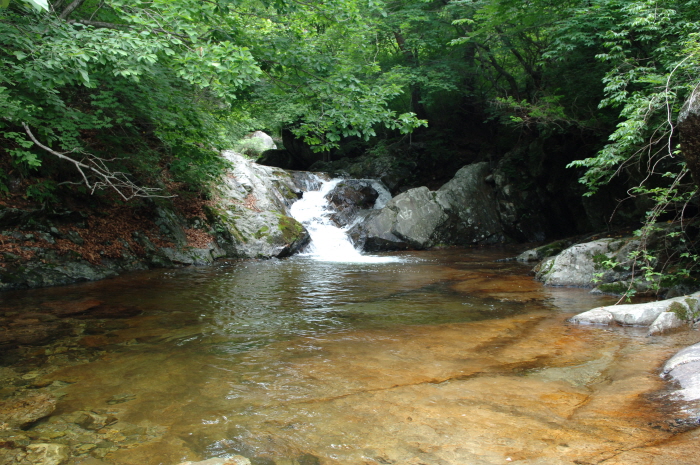Welcome to Jukgyegugok Valley: A Nature Lover’s Paradise
Welcome to Jukgyegugok Valley, an enchanting destination that will captivate your senses and leave you in awe of its natural beauty. Nestled between Baejeom-ri and Choamsa Temple, this picturesque valley has served as a source of inspiration for centuries. It was here that the renowned Joseon-era Confucian scholar, Toegye Yi Hwang, found solace in the tranquil scenery and the soothing sound of the flowing water. His admiration for the valley led him to name each of its nine sections and collectively call them Jukgyegugok, meaning “nine bamboo valleys.”
As you explore Jukgyegugok Valley, you will be greeted by crystal clear waters, verdant forests, and striking white rocks that create a truly breathtaking sight. During the hot summer months, visitors from all over the country flock to the valley to seek respite from the sweltering heat by dipping their feet in the refreshing waters. The valley offers a serene escape from the hustle and bustle of city life, allowing you to reconnect with nature and find inner peace.
Must-Visit Attractions
- Choamsa Temple: Situated at the foot of Sobaeksan Mountain and accessible via a path that ascends from Jukgyegugok Valley, Choamsa Temple holds a significant place in the region’s history. It was originally established by the great monk Uisang Daesa of the Silla Kingdom, who sought a site to build a Buddhist temple invoking national security. Although the original structure was destroyed during the Korean War, it has been painstakingly restored by Buddhist monk Lee Bo-won to its present state.
- Sosuseowon Confucian Academy: Located near Jukgyegugok Valley, Sosuseowon Confucian Academy is a tranquil haven of learning and reflection. This historic academy was built to honor the teachings of Confucius and has served as a center for Confucian studies for centuries. Immerse yourself in the rich cultural heritage and appreciate the architectural beauty of this esteemed institution.
- Buseoksa Temple: Another notable attraction in close proximity to Jukgyegugok Valley is Buseoksa Temple. Founded by Uisang Daesa, this temple is renowned for its historical and religious significance. Take a moment to admire the intricate temple structures, soak in the peaceful atmosphere, and learn about the profound spiritual practices that have taken place within its walls.
- Eupnaeri Mural Tomb: For those interested in ancient history, a visit to Eupnaeri Mural Tomb is a must. This remarkable tomb is adorned with exquisite murals depicting scenes from the past, offering a glimpse into the lives and traditions of those who lived in the region centuries ago. Marvel at the intricate craftsmanship and unravel the stories hidden within these ancient artworks.
Getting Here
If you’re traveling by train, you can take the Jungang Line to Punggi Station. From there, a short taxi ride of approximately 40 minutes will bring you to the valley, covering a distance of around 15.43km. The estimated taxi fare is approximately 17,000 won.
If you prefer to travel by bus, head to the Central City Terminal and board an express bus bound for Yeongju Bus Terminal. From Yeongju, you can catch a bus to Baejeom-ri, which takes around 50 minutes. Bus departures from Yeongju are available at 06:20, 08:10, 14:00, 16:00, and 18:50.
Prepare to be immersed in the natural wonders of Jukgyegugok Valley. Whether you’re seeking tranquility, cultural experiences, or a chance to reconnect with nature, this destination promises to deliver an unforgettable journey. Pack your bags, embark on an adventure, and let the beauty of Jukgyegugok Valley leave a lasting impression on your heart.

